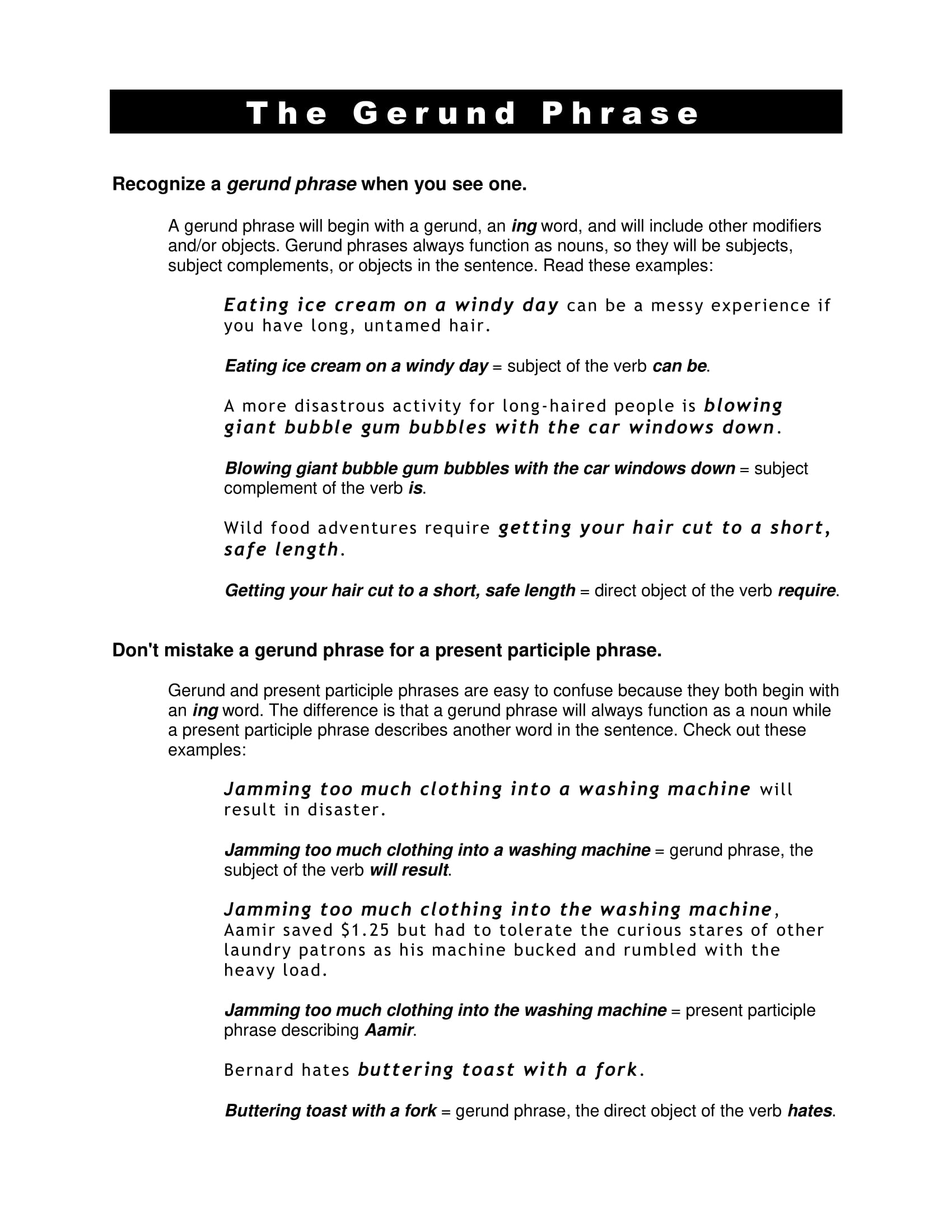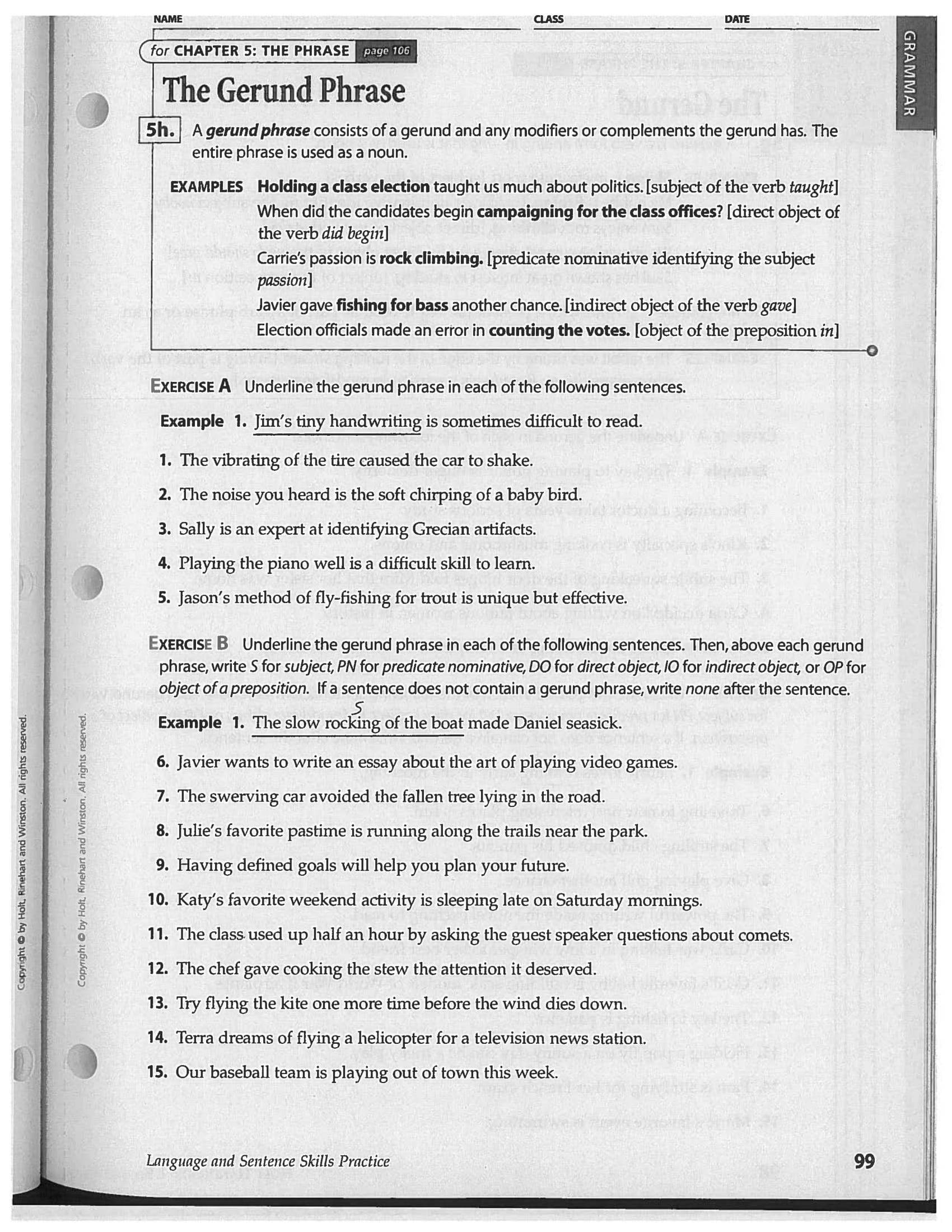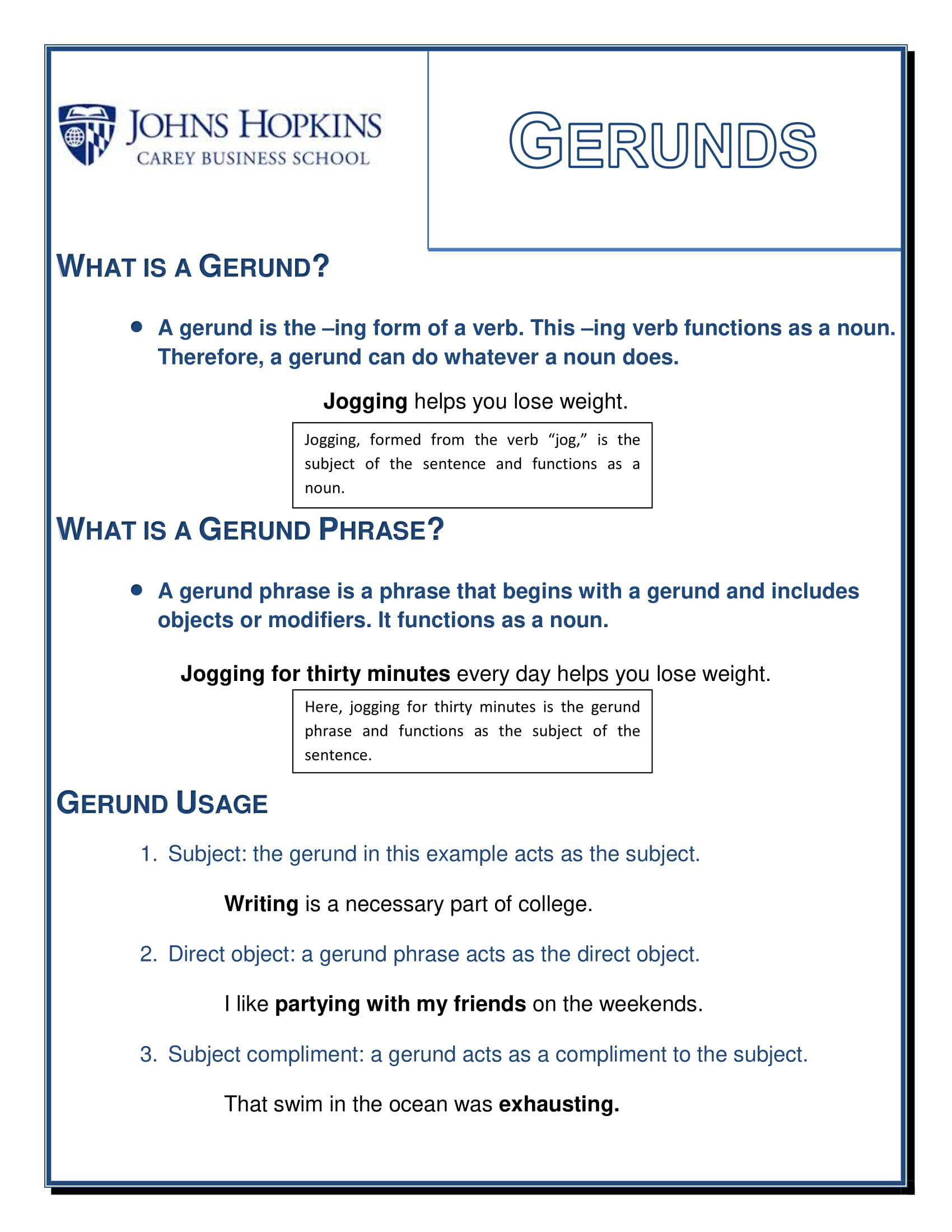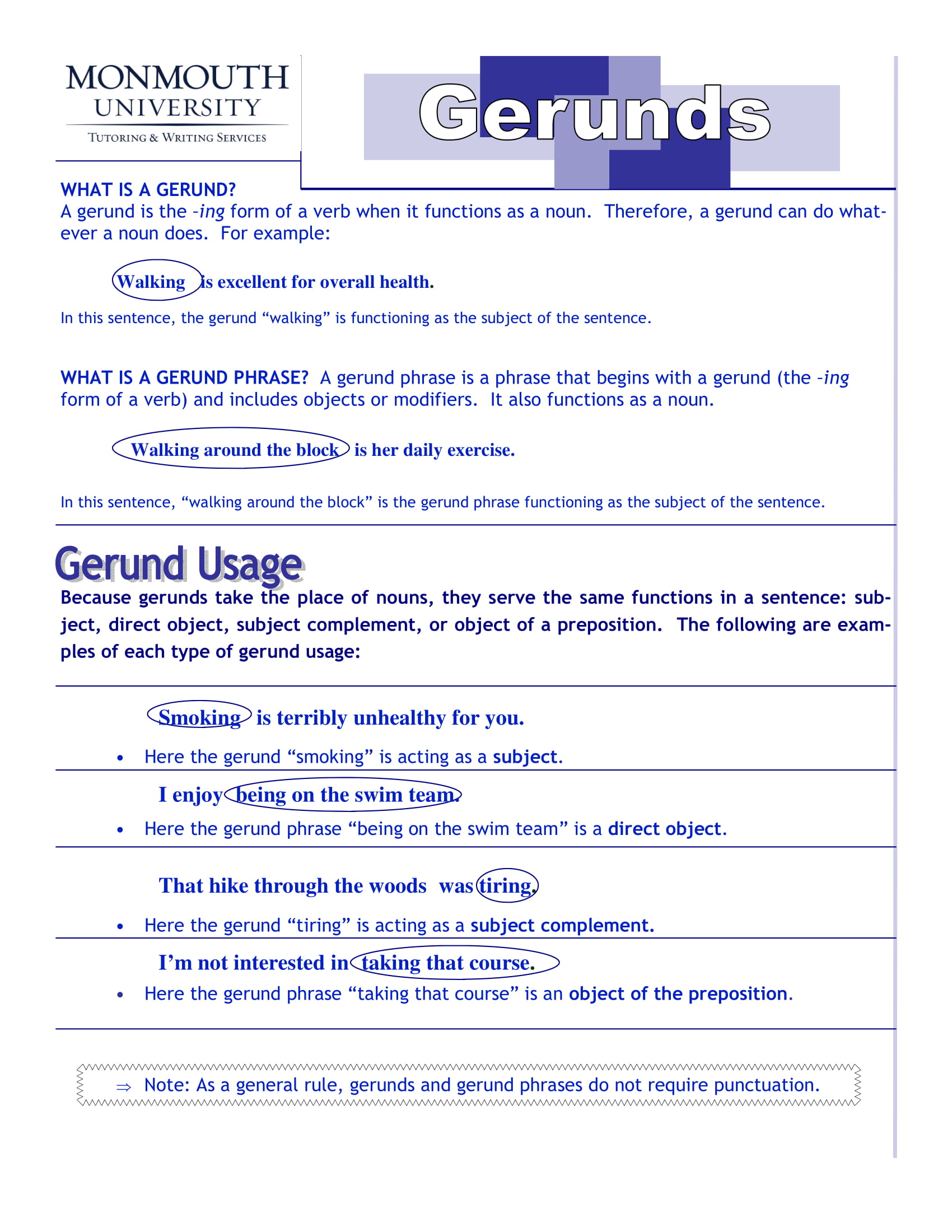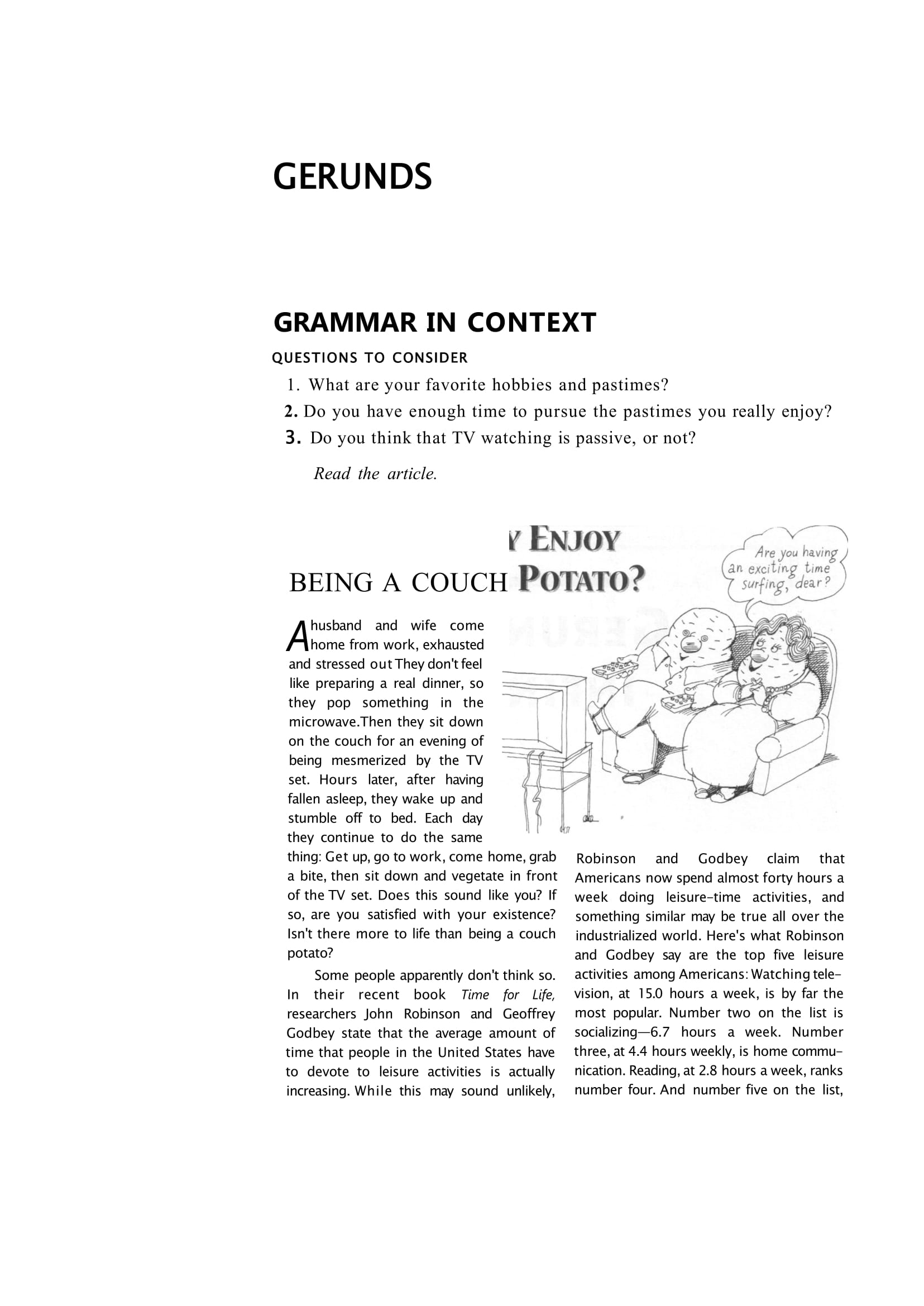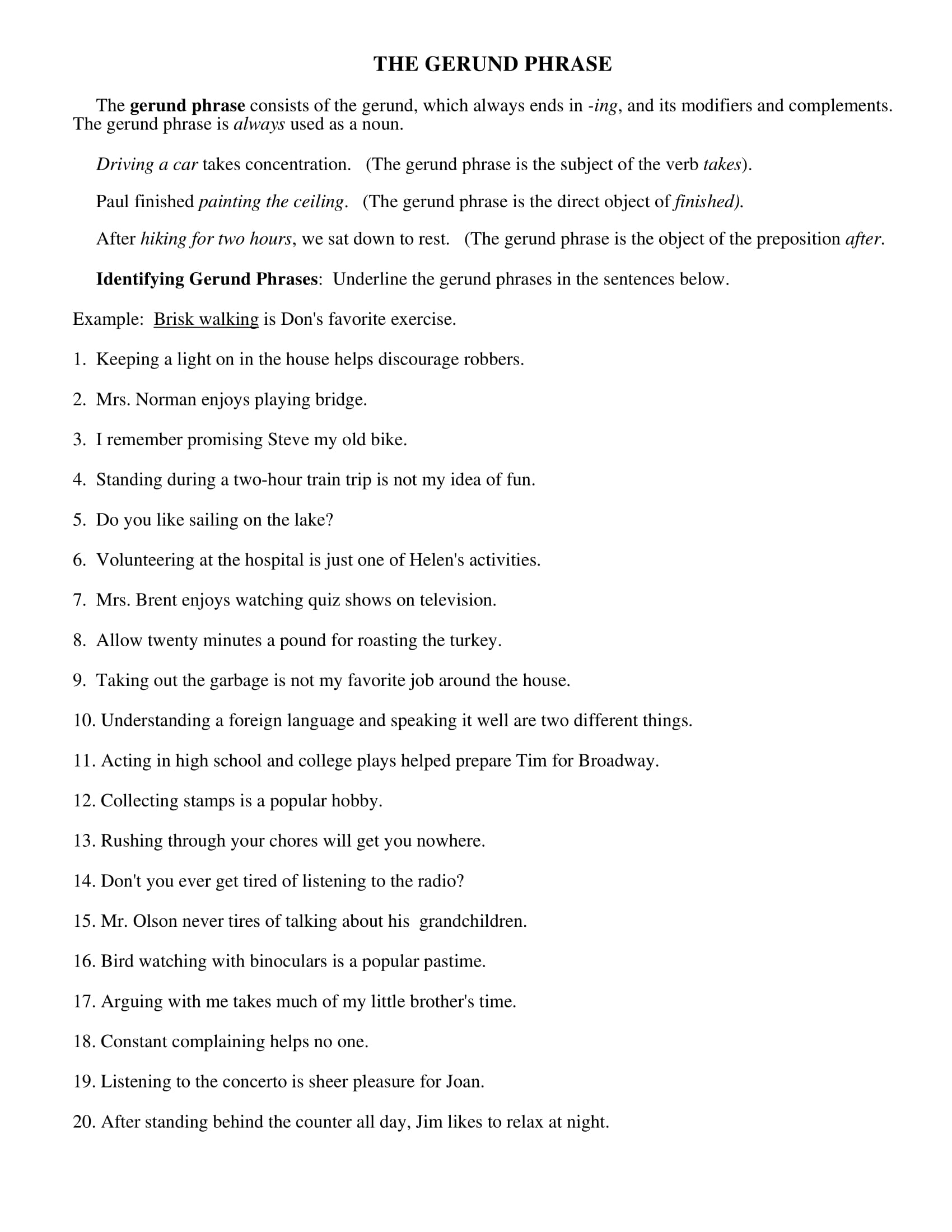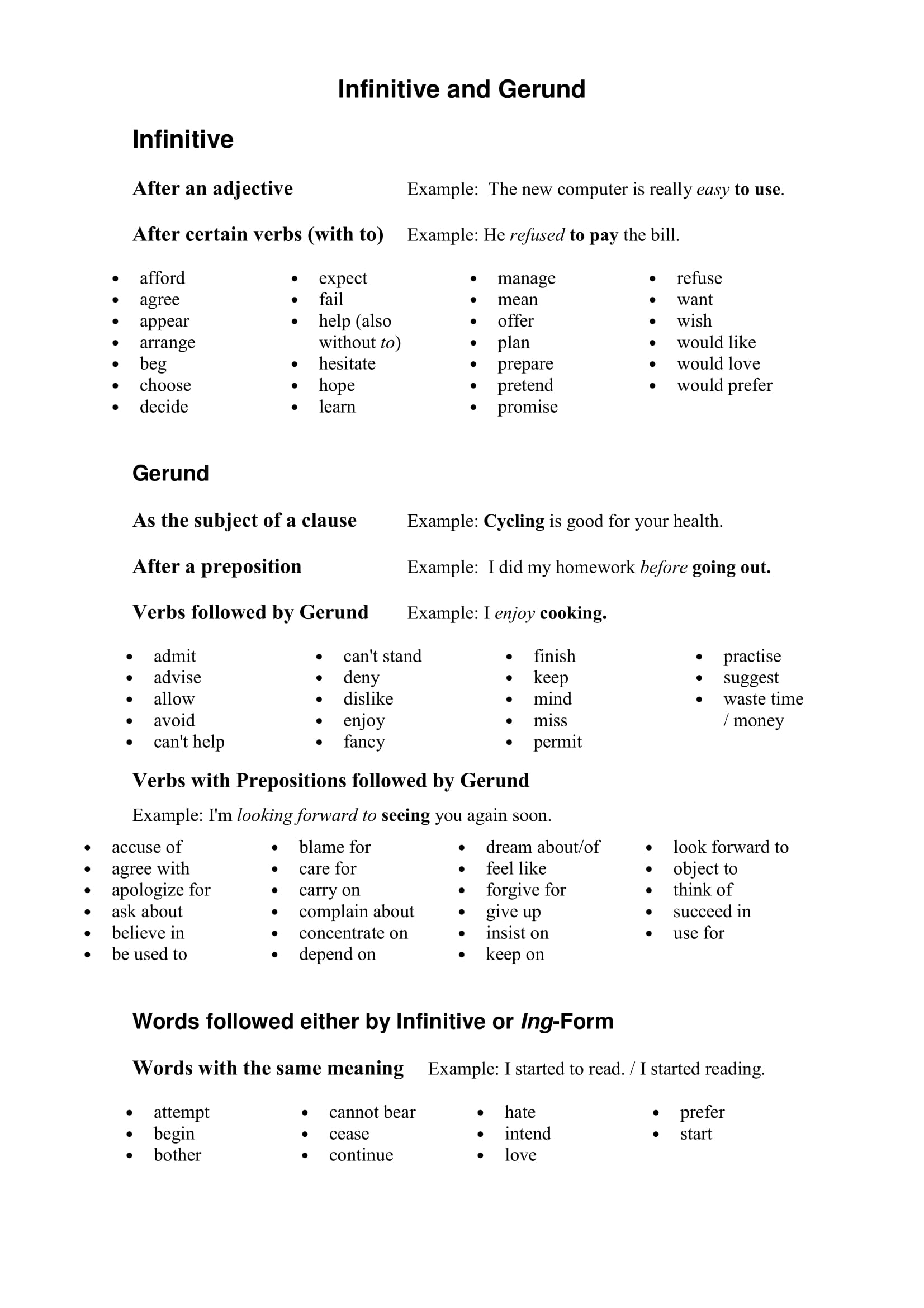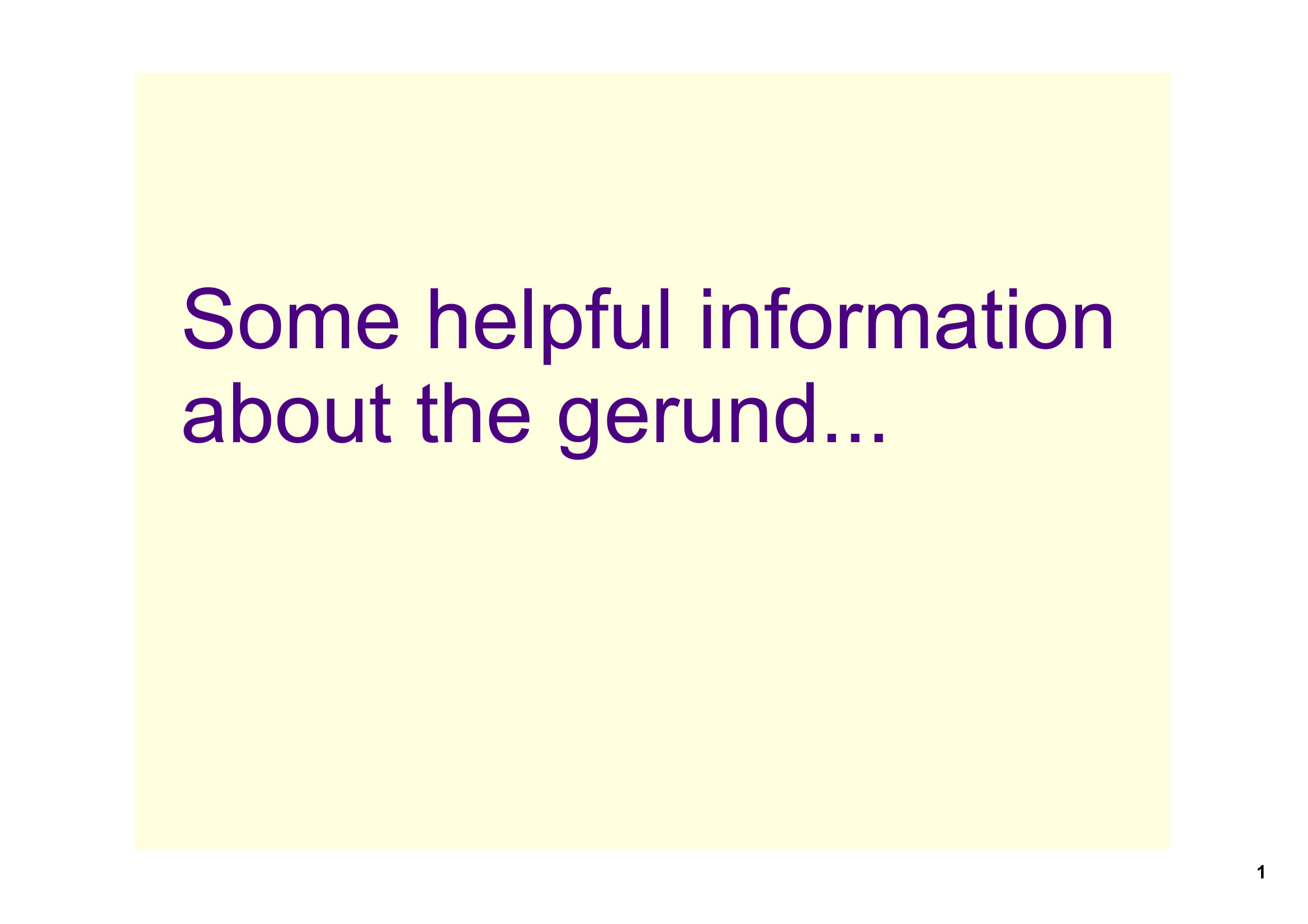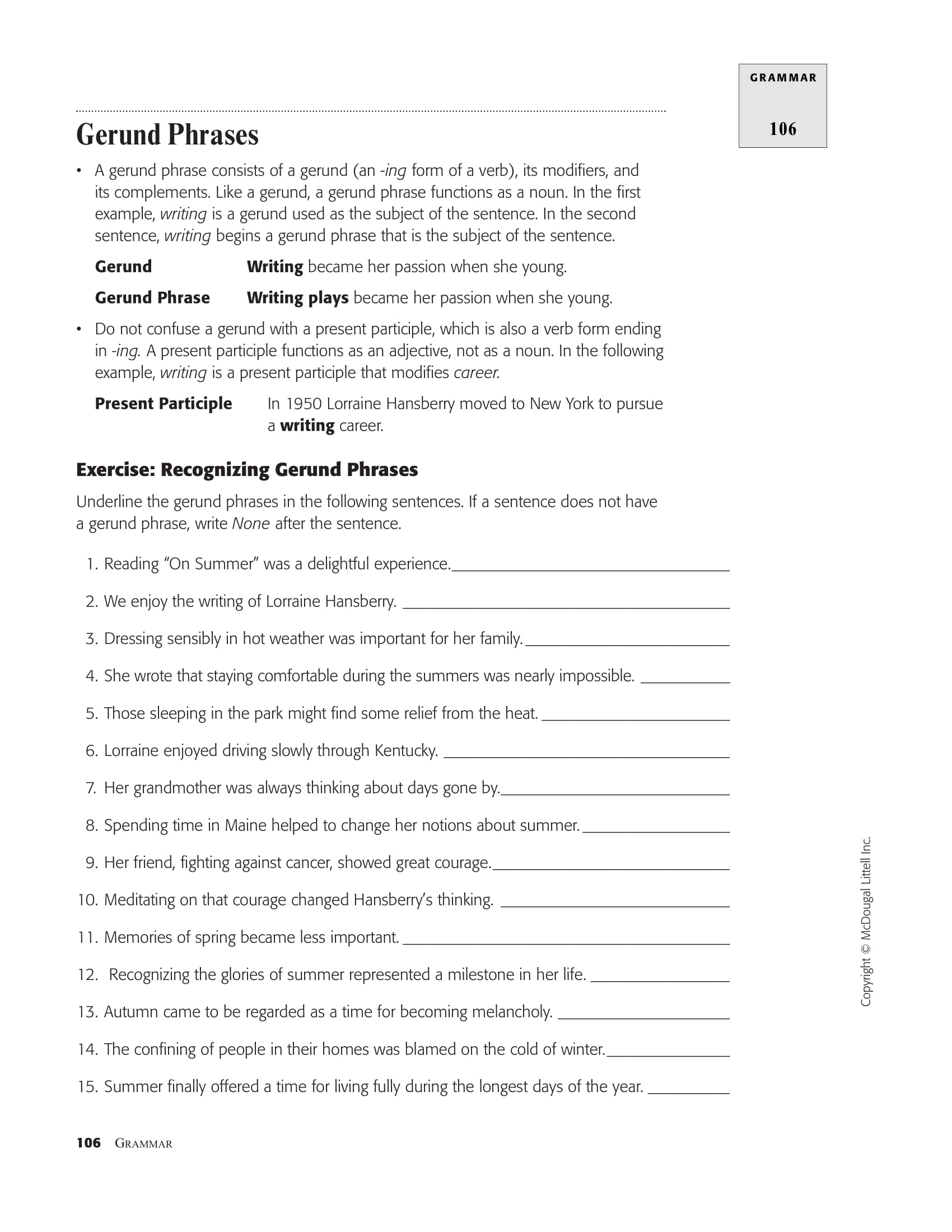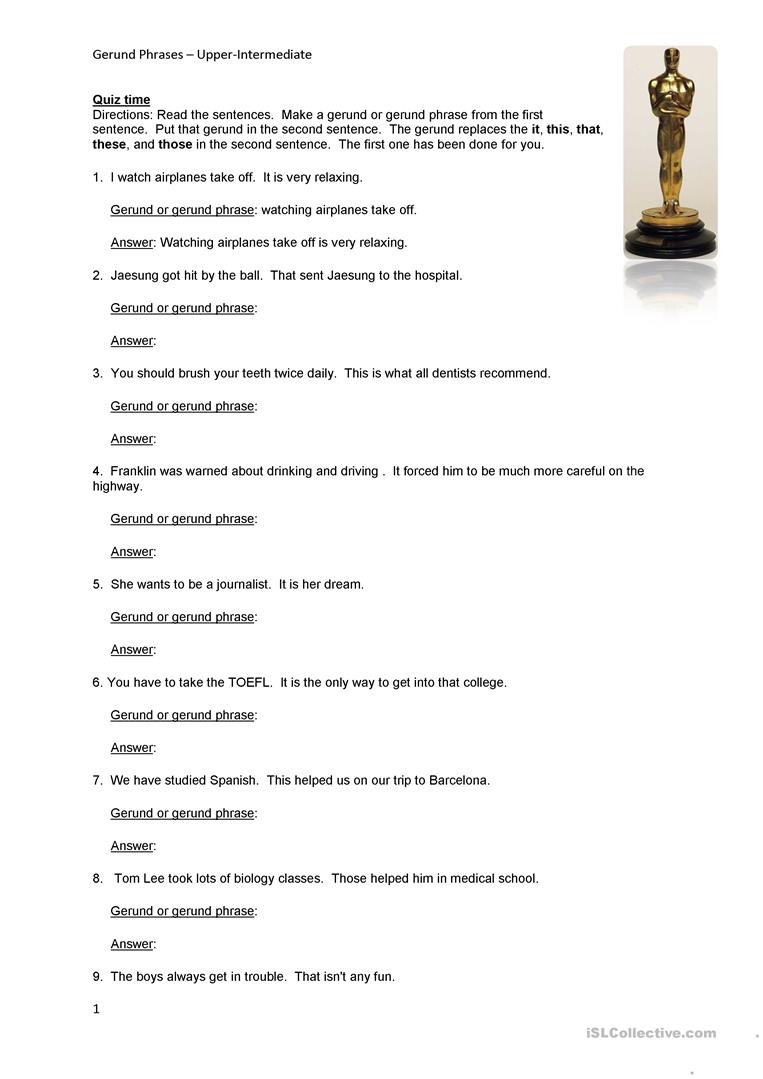9+ Gerund Phrase Examples
The English language is far more complicated than you may think. Understanding the role that nouns, verbs, adjectives, pronouns, adverbs, prepositions, conjunctions, and interjections play in speech is essential in enhancing our skills in writing and reading. But there are also times when one part of formal speech can take on the role of a different part of speech. When verbs begin acting as nouns in a phrase or sentence, they are referred to as gerunds.
In this article, we discuss the basics of gerund phrases and how they are used in everyday speech.
Examples of Gerund Phrases
Gerund Phrase Practice Packet Example
Gerund Phrases for Students Example
What Is a Gerund Phrase?
Cooking spaghetti is an easy task.
By definition, verbs are words that portray an action or state of being. Cooking when used without context is considered to be a verb. But in the example above, cooking is a transitive verb that is followed by the direct object, spaghetti. Since cooking acts as a noun in the sentence rather than a verb, it becomes a gerund. Combining the gerund example with the direct object spaghetti then forms a gerund phrase.
It’s not hard to understand what a gerund phrase is, especially if we’ve become familiar as to what gerunds actually are. So before we continue on with the topic of gerund phrases, let us begin by defining gerunds.
Definition of a Gerund
Rumor has it that he’s a phony, a fraud, and a fake! But he actually goes by the name that linguists have established for him: gerund.
You must be wondering, why would people call him such names?
The answer to this question is easy. A gerund is a form of verbal, which refers to a verb that acts like (or even pretends to be) a different part of speech. They are technically words of actions that function as nouns in a sentence. It’s pretty confusing if you don’t already know the difference between a verb and a noun.
Verbs show the action in a sentence, while nouns refer to a person, place, thing, or event. To make it a gerund, you must add “-ing” to the end of your verb and use it as a noun in the sentence.
Let’s study the example below:
Adam is running to his next class.
Here, running clearly indicates an action that is being exhibited by the subject. But if we change the context of the sentence by rearranging a few words, it becomes:
Running is the only way Adam could get to his next class.
Here, the word running, which was previously used as a verb, now becomes the subject of the given example. Since a subject is typically the who or what of a sentence, it is considered as the noun. Transforming a verb (the action being shown) to a noun (the thing being discussed) is pretty easy, as long as you’re aware of how each type of simple speech should be used in a sentence.
Other Gerund Examples
- Diving can be dangerous if done in the dark.
- Reading is my all-time favorite pastime.
- Dreaming is my hobby during long weekend breaks.
- Traveling is the perfect way to widen your view of the world.
- My passion is in acting.
There are many cases where gerunds are used in a phrase. A gerund phrase generally consists of a gerund, which is the -ing word, along with any modifiers or objects associated with it. What makes a gerund different from a simple noun is that it does not have a proper plural form. You may also see infinitive phrase worksheets and examples.
Gerunds simply serve as a pure verbal noun, which provides variations to sentences in a text. In most cases, we use gerunds to add a variation to our writing, allowing us to convey different nuances of the same words or sentences. You may also like different types of transitional phrases and sentences.
Gerund Phrases for Writers Example
Gerund Phrases in Context Example
Gerund Phrase Worksheet Example
Infinitive vs. Gerund Phrases Example
How Do They Function?
Gerunds can work alone, or they can be banded together with other words to formulate a gerund phrase. Collectively, the phrase may function as a noun.
Like a regular gerund, a gerund phrase always functions as a noun, and can act as a subject, direct object, indirect object, object of a preposition, or predicate nominative in a sentence. Most gerund phrases also include prepositions (about, at, but, by, for, from, in, into, of, on, onto, since, to, until, upon, with), making it easier for readers to identify. You may also see preposition sentences examples.
Simply put, there are four types of gerunds and gerund phrases used in speech. These are as follows:
1. Subject
Gerund phrases can be used as a subject in a sentence. This refers to what or who is being discussed about in the sentence. Similar to these examples:
- Watching television is my favorite to-do on a Saturday night.
- Gardening in the summertime can get challenging due to the harsh heat of the sun.
- Eating ice cream on a windy day is a struggle for anyone with long, untamed locks.
- Riding a roller coaster scares my husband.
- Climbing Mt. Everest is a long-time dream of mine.
You may also like examples of oxymoron in sentences.
2. Direct Object
Gerund phrases don’t always have to be the subject of a sentence, as they could also function as a direct object. Direct objects are responsible for receiving the action of the verb.
- Jasmine loves jumping on the bed.
- Josh enjoys cooking with his mom.
- The coach appreciated my playing this season.
- In the summer, Karol prefers swimming in the lake.
- Anna narrowly avoided falling off the cliff.
You may also check out examples of hyperbole expressions.
3. Indirect Object
The purpose of an indirect object is to receive the direct object in the sentence. This is done to answer the questions, “to whom?” or, “to what?”
- As part of the advice given by his doctor, Gerald gave eating every three hours a try.
- In South America, Keelin made running every day a priority.
- Kyle considers walking the dog his favorite chore.
- Mary’s only passion was improving the lives of others.
- Her least favorite activity is swimming in the ocean.
You might be interested in appositive examples.
4. Predicate Nominative
Also known as subject complements, a predicate nominative follows the linking verb and renames the subject in the sentence. Some examples of gerund phrases used as predicate nominatives include:
- The most fun I had on this trip was swimming with the dolphins.
- A good career for Meredith might be nursing the elderly.
- Ken’s favorite afternoon exercise is playing basketball.
- I do my cleaning in the morning.
- Tristan’s main interest is working with computers.
You may also see creative examples of idioms.
5. Object of a Preposition
The examples below are gerund phrases used as objects of the preposition, which follow the preposition to complete its meaning:
- Isla got into trouble for talking to Etienne.
- I spent my afternoon reading a book about driving a car.
- My younger brother’s attitude about studying for exams improved.
- Lea’s perception about gardening for fun changed.
- Some people consider my interest in quilting an obsession.
You may also like idiomatic expressions and their origin.
Dangling Gerunds
You might have heard about dangling participles before; dangling gerunds are relatively similar. Though they may not occur too often, they can appear whenever gerunds or gerund phrases act as objects of a preposition, such as “before,” “after,” “by,” or “with.” You may also see clause examples.
For example:
By running with a pack of safety pins, Jasmine’s pet dog suffered some battle scars.
Here, the gerund phrase is said to be dangling because of how it is mismatched with the subject that follows. This creates an illogical scenario that could easily be misunderstood for something else.
The writer or speaker of the statement undoubtedly intended to convey that when Jasmine ran with the the pack of safety pins, her pet dog was injured. But as the sentence was constructed, it’s almost as if it was Jasmine’s pet dog who ran with the pack of safety pins. You may also like metaphor examples.
The best way to correct sentences that contain danglers is to rewrite the whole thing and give the sentence a proper subject. There are a number of ways to do this without adding too much words. For instance:
1. By running with a pack of safety pins, Jasmine gave her pet dog some battle scars.
2. Jasmine wounded her pet dog when she ran with a pack of safety pins.
3. Jasmine’s penchant for running with a pack of safety pins has left some battle scars on her pet dog.
Gerund Phrases vs. Present Participle Phrases
Another thing you should look out for are words that look like gerunds but are actually participle phrases. It’s easy to mistaken one for the other because of how they are used in a sentence. You may also see anaphora examples.
Example:
- My cat’s most annoying habit is hogging my side of the bed.
- The other night, I had to sleep on my daughter’s bed because I found my cat Harlo hogging my side of the bed.
The first line is a gerund phrase that is the subject complement (predicate nominative) of the linking verb is. The second line, however, is an example of a present participle phrase that’s describing the speaker’s cat Harlo.
One of the easiest ways to distinguish a gerund phrase from a participle phrase is to see whether the phrase functions as a noun. If it does, it’s a gerund. But if it’s used as a modifier, which can either be an adjective or an adverb, then it’s a participle phrase. You may also like examples of personification for kids.
You can also replace the word or phrase with the word something to determine whether it’s a gerund or a present participle. If the word something works well in the sentence, then the word or phrase can classify as a gerund. You may also check out examples of assonance.
Learning Gerund Phrases Example
Recognizing Gerund Phrases Example
Simple Gerund Phrase Worksheet Example
Examples of Gerund Phrases
To learn more about how gerund phrases are used in a sentence, try studying the examples below:
- The most disastrous activity for women with long, curly hair is blowing huge bubble gum bubble with the car windows down.
- Piling a dozen heavy boxes on a wooden table is a disaster waiting to happen.
- Eating a glass of ice cubes on a summer day can be a great way to cool off.
- The Carters really enjoy bothering the entire neighborhood with loud music.
- Eating freshly picked fruits without washing them might make you sick.
Examples of Gerunds in Literature
Gerunds and gerund phrases are a part of commercial speech, which means you’re likely to find them in many literary works as well. Although we’re quite used to hearing these words and phrases from professors, parents, and potentially everyone around us in their everyday conversations and lectures, it’s exciting to see how famous authors use them in writing stories and plays.
Let’s take a look at some common examples of gerunds used in literature:
1. Example
“This is the true joy in life, the being used for a purpose recognized by yourself as a mighty one; the being thoroughly worn out before you are thrown on the scrap heap; the being a force of nature instead of a feverish, selfish little clod of ailments and grievances complaining that the world will not devote itself to making you happy.” You may also see negative connotation examples.
—George Bernard Shaw, Man and Superman
There are three gerunds used in this example, one of which had been used twice to perform the role of a subject.
2. Example
“So with the lamps all put out, the moon sunk, and a thin rain drumming on the roof a downpouring of immense darkness began…Only through the rusty hinges and swollen sea-moistened woodwork certain airs, detached from the body of the wind (the house was ramshackle after all) crept round corners and ventured indoors. Almost one might imagine them, as they entered the drawing-room questioning and wondering, toying with the flap of hanging wall-paper, asking, would it hang much longer, when would it fall?” You may also like parallel sentences structure and examples.
—Virginia Wolf, To the Lighthouse
The words drumming, downpouring, questioning, wondering, toying, and hanging in this passage are all examples of gerunds.
Gerunds are everywhere. You wouldn’t believe how often we use gerunds in our everyday language, consciously or not. What makes this part of basic speech so interesting is how they could easily deceive an audience who don’t pay attention to how these words were used in the sentence. Spotting gerunds and using them correctly in a sentence will definitely help refine your reading and writing skills in the best way possible.



